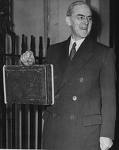Richard Stafford Cripps 1889 – 1952
October 28, 2008
 Richard Stafford
Cripps 1889 – 1952
was a British Labour politician and Chancellor of the
Exchequer
from November 1947 to October 1950.
Richard Stafford
Cripps 1889 – 1952
was a British Labour politician and Chancellor of the
Exchequer
from November 1947 to October 1950.
Stafford Cripps had homeopathic treatment whilst in India, and was an associate of homeopathic supporters Mohandas Karamchand Gandhi, Jawaharlal Nehru and Sri Aurobindo. Cripps was a vegetarian, and he suffered from recurring illness which was alleviated by nature cure and a vegetarian diet.
Stafford Cripps was a colleague of Aneurin Bevan, Victor Gollancz (who was the publisher of Ivy Compton Burnett), James Ramsay MacDonald, and as President of the Fabian Society, he knew homeopathic supporters Herbert George Wells, Havelock Ellis, Sidney and Beatrice Webb and George Bernard Shaw.
Stafford Cripps was born in London. His father was a Conservative member of the House of Commons who late in life, as Lord Parmoor, joined the Labour Party. His mother, the former Theresa Potter, was the sister of Beatrice Webb.
Cripps grew up in a wealthy family and received the benefits of an aristocratic upbringing. He was educated at Winchester College and at University College London, where he studied chemistry. He left science for the law, and in 1912 was called to the bar as a barrister. He served in the First World War as an ambulance driver in France and also successfully managed a factory producing armaments.
Richard Stafford Cripps was born in London on 24th April, 1889. His mother, Theresa Cripps, was the sister of Beatrice Webb. After an education at Winchester and New College Oxford, he became a research chemist. He also carried on studying law and was called to the bar in 1913.
Cripps was a pacifist and during the First World War served with the Red Cross in France. In 1918 Cripps returned to his work as a barrister. Specializing in company law, Cripps made a fortune in patent and compensation cases.
A Christian Socialist and member of the Labour Party, Cripps was elected to the House of Commons in 1931 at a by election in East Bristol. The following year James Ramsay MacDonald appointed Cripps as his solicitor general. However, like most members of the party, Cripps refused to serve in James Ramsay MacDonald’s National Government formed in 1931.
In the 1930s Cripps was converted to Marxism and became one of the most prominent left wing figures in Britain. In 1936 Cripps joined with other socialists such as Victor Gollancz, Aneurin Bevan, George Strauss and Ellen Wilkinson to start a left wing weekly journal called Tribune. Largely funded by Cripps, Tribune advocated socialist solutions to domestic and international problems.
After the outbreak of the Spanish Civil War Cripps campaigned for the formation of a Popular Front with other left wing groups in Europe to prevent the spread of fascism. He became involved in a dispute with the leadership of the Labour Party over this issue and in 1939 Cripps and Aneurin Bevan were expelled from the party.
For the first two years of the Second World War Cripps and Aneurin Bevan provided the main opposition to Britain’s coalition government. In a survey carried out in 1941, the public was asked who should be prime minister if anything should happen to Winston Churchill. Of those who replied, 37% said Robert Anthony Eden 1st Earl of Avon and a surprising 34% selected Cripps.
Winston Churchill now became concerned about having one of his main critics so high in the polls. In 1942 Winston Churchill appointed Cripps as Lord Privy Seal in his government and put him in the War Cabinet. However, Cripps continued to question Winston Churchill’s war strategy and in October 1942 he was removed from the War Cabinet. He remained in the government and now became Minister of Aircraft Production.
On Cripps removal from the War Cabinet, Hugh Dalton recorded in his diary: “He has, I think, been very skilfully played by the P.M. He may, of course, be quite good at the Ministry of Aircraft Production, but seldom has anyone’s political stock, having been so outrageously and unjustifiably overvalued, fallen so fast and so far.”
In 1945 Cripps published his book Towards a Christian Democracy and his readmittance to the Labour Party. Following the 1945 General Election, the new Prime Minister, Clement Richard Attlee 1st Earl Attlee, appointed Cripps as Minister of Trade. Two years later Cripps replaced Hugh Dalton as Chancellor of the Exchequer. His policy of high taxation, tight public spending and a voluntary wage freeze, helped to keep inflation in Britain under control.
In October 1950 poor health forced him to resign from the government. The following year was elected as President of the Fabian Society.
Richard Stafford Cripps died in 1952.